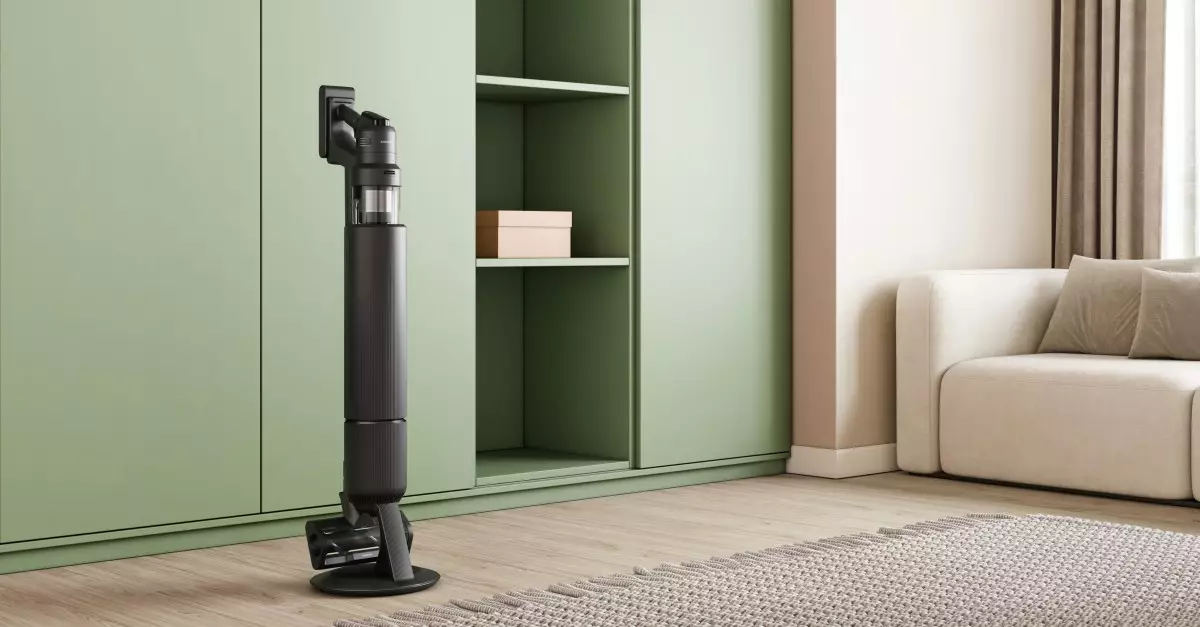As technology continues to evolve, our relationship with household appliances is undergoing a significant transformation. The emergence of smart appliances has redefined what it means to manage daily chores, making them more efficient, interactive, and connected. Samsung’s latest offerings, particularly the Bespoke AI Jet Ultra vacuum and the Bespoke AI Laundry Vented Combo washer/dryer, are pioneering this change with innovative features that not only enhance functionality but also integrate seamlessly with our digital lives.
The Bespoke AI Jet Ultra vacuum, priced at $1,099, is more than just a cleaning device; it’s an interface for communication. Equipped with an LCD control panel, this cordless stick vacuum connects to your smartphone, ensuring you never miss important notifications while multitasking at home. An incoming call or text can now be addressed without interruption, a revolutionary step that acknowledges our increasingly distracted lifestyles. With a powerful 400AW suction capability and a battery life of up to 100 minutes, this vacuum stands out for its performance as well as its connectivity, reinforcing the trend towards more intelligent, user-focused technology.
Redefining Laundry Days
The evolution of home appliances isn’t limited to cleaning alone. Samsung’s new Bespoke AI Laundry Vented Combo washer/dryer at $3,099 is a prime example of how technology can redefine our laundry experiences. With an intuitive 7-inch LCD touchscreen, users can directly answer phone calls without searching for their devices while dealing with loads of laundry. Such a feature may seem trivial at first glance; however, it symbolizes the commitment to making everyday chores more streamlined and less intrusive.
Additionally, the washer/dryer combo does the heavy lifting beyond mere communication. It intelligently dispenses detergent, opens its door once the cycle is complete, and contributes to an overall reduction in the monotony associated with laundry tasks. Integration into Samsung’s larger ecosystem means users can experience a thoroughly connected home where every appliance communicates and collaborates.
The Broader Implications of AI in Home Management
Samsung’s commitment to creating a cohesive smart home experience is encapsulated within its AI Home branding. The company has extended this design philosophy across various appliances, including smart fridges and ovens, all featuring these practical touchscreens that host a plethora of apps—from music and weather updates to cooking guidance. Imagine pulling up a recipe, sending instructions directly to your oven, and managing it all from a screen situated in your kitchen. It’s convenience at its finest, allowing multitasking without losing focus on the tasks at hand.
Linking these smart appliances to the SmartThings platform introduces an additional layer of connectivity. Users can receive notifications from their other smart home devices directly through their appliances. For example, while unloading laundry, you can communicate with visitors at your front door via a connected video doorbell. This interconnectedness exemplifies how technology can serve as a backdrop in our daily lives, improving efficiency and alleviating stress when managing various responsibilities.
The Dilemma of Over-Integration
Despite the positive aspects of smart appliances, there’s a pertinent conversation regarding their ubiquity. The proliferation of screens in home devices could be seen as excessive—an argument that highlights the potential drawbacks of integrating touch technology into every corner of our homes. Not only could these screens become vulnerable to damage, but they may also contribute an outdated feel to devices over time—imagine needing to replace a high-cost appliance due to a faulty control panel rather than a simple mechanical part.
Furthermore, there exists a valid concern regarding the potential for these smart appliances to serve as vehicles for advertisements. As seen with products from other tech giants, the prospect of receiving promotional content on your refrigerator screen raises questions about privacy and user experience. Although Samsung has not pursued such avenues, the mere existence of such a possibility can make consumers wary of embracing a fully integrated smart home environment.
While the intention behind these technological upgrades is to simplify our lives, one cannot help but ponder whether the emphasis on screens and smart interfaces is genuinely necessary or merely a gimmick. Balance in this evolution is crucial; appliances must both serve their core functions effectively and enhance our daily routines without overshadowing their practicality.
As we tread further into an era dominated by smart technology, the challenge lies in discerning which innovations genuinely improve our lives versus those that might lead to unnecessary complexity and distractions.

